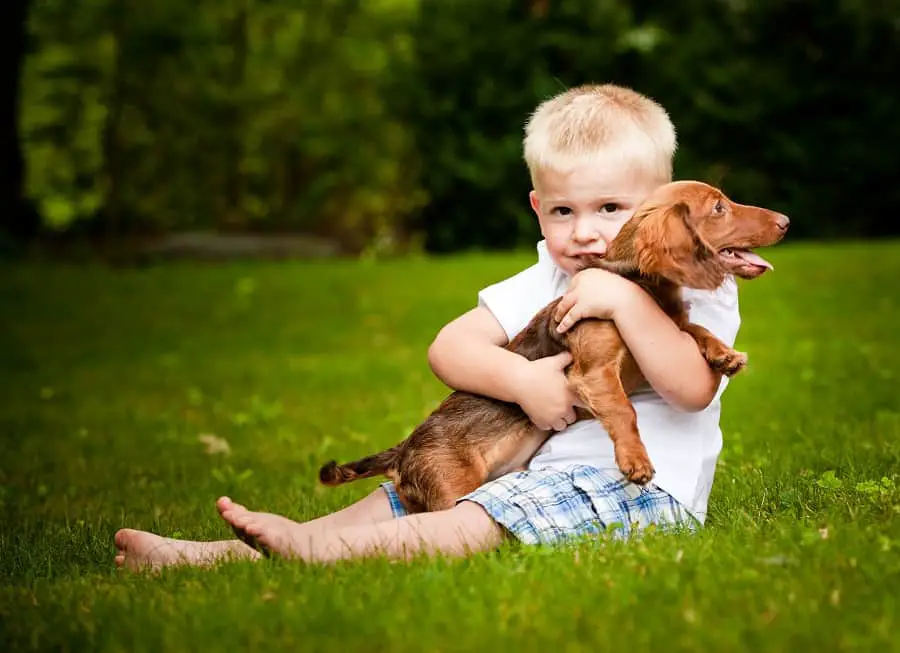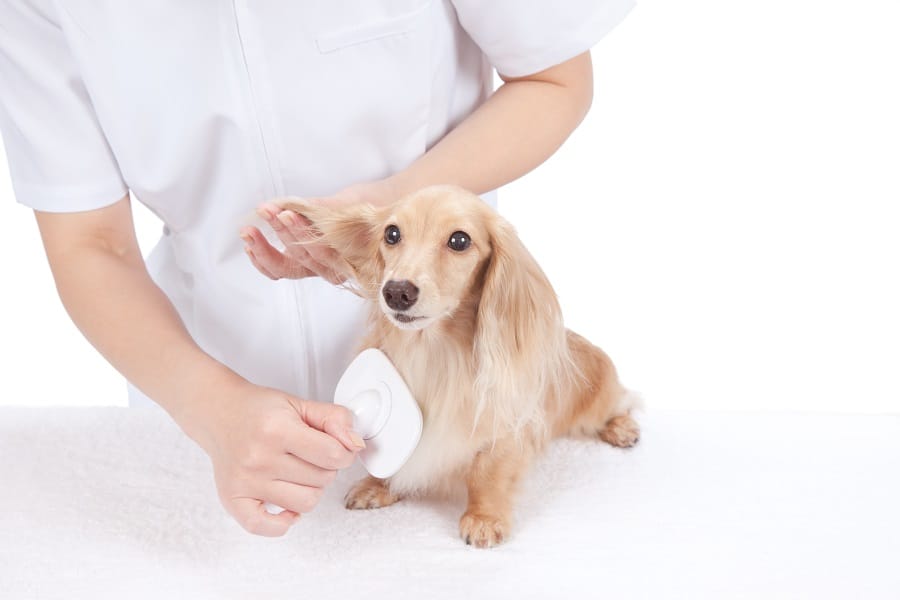“Nothing will turn a man’s home into a castle more quickly and effectively than a dachshund.”
The quote, attributed to Queen Victoria, is a sentiment echoed timelessly by proud pup-parents of these goofy, intelligent animals.

Dachshunds, affectionately called “wiener dogs”, “hot dogs” or “doxies” among a long list of nicknames, may be small in size but have big, endearing personalities that make them irreplaceable additions to the family, despite their reputation for occasional stubbornness.
For Starters, They’re Great Watchdogs
It’s wired into their systems – dachshunds belong to the “hound” breed group, bred specifically to hunt badgers and other burrow-dwelling animals.
In fact, the name “dachshund” originates from the German words for “badger” (dachs) and “dog” (hund).
Their elongated bodies and short legs are the perfect build to maneuver narrow subterranean tunnels, their large paws paddle-shaped for precision as they dig, long noses equipping the breed with a keen sense of smell.
Small they might be, but this breed is designed to be muscular, barrel-chested and with impressive lung capacity, such that they can alert hunters and owners of their locations with their deep, booming barks and hold their own in a fight.
Their physique lends to the personality of dachshunds too – they are fearless, willing and determined to take on opponents much larger than themselves, and fiercely protective if they perceive a danger to themselves, their humans or their domain.
It’s precisely this fact that makes dachshunds wonderful protectors – not only are they willing to jump into the fray at the slightest whisper of danger, but their alertness and penchant for barking the moment their hackles are raised make them the most effective security alarms.
They might be small, but they can out-bark bigger breeds any day of the week.
It’s important to note, though, that dachshunds’ fondness for barking might not sit well with everyone.
If you live in an apartment complex or condo, it’s wiser to take into consideration how agreeable your neighbors will be to hyperactive barking before deciding to adopt a doxie, because boy do they love to bark.
They’re Also Great Indoor Dogs
If your neighbors are okay with it, though, dachshunds are going to be perfectly happy living in apartments or being indoors in general.
Dachshunds are classified into two main sizes – standard, between 16 to 32 pounds, and miniature, 11 pounds and under (doxies between 11 and 16 pounds are called “tweenies”, though this isn’t an official classification).

Dachshunds in general are not built for kennel-living or the outdoors, and may even need some convincing to go outside to relieve themselves if it’s raining – on the other hand, they tend to be perfectly happy and active indoors, with daily half-mile walks about twice a day enough for a healthy puppy lifestyle.
This is perfect for owners who might be living in more urban communities or in apartments, without the ready availability of a lot of free space to run around in.
Their small sizes make them perfect for families who don’t have the abundance of space for larger dogs to live and play about in, but don’t let their size fool you.
They’re an energetic breed, so it’s important to make sure your doxie gets the right degree of exercise to avoid putting on too much weight or develop behavioral disorders which might include irritability and depression.
Again, a big part of a dachshund’s suitability for family life falls on the owner.
While energetic, it’s important for owners to be informed of potential risks, such as dachshunds’ susceptibility to developing back trouble from herniated disks, which might be caused by jumping up and down furniture and stairs or excessive weight gain, and their penchant for willfulness when being housetrained.
The onus is on owners to ensure doxies are trained properly – crate training might be useful to tone down some of a dachshund’s inherently destructive instincts, such as the need to burrow (which might result in your neatly planted flowerbeds being dug up in an earthy mess), and to get them used to temporary confinement, so that, for instance, they wouldn’t react adversely to a carrier on route to the vet.
Other important practices include training your pup to climb up ramps to reach taller furniture, so they don’t risk hurting their backs, and using indoor pee-pads when they can’t run outdoors to relieve themselves.
Dachshunds may not be the most docile breed to housetrain, but their loveable and quirky personalities more than make up for the effort. The key is patience, consistency and lots of love.
Are Dachshunds Friendly?
Absolutely. Dachshunds are loving, affectionate and goofy dogs, but they are also suspicious by nature and might be aloof or antagonistic towards strangers, including children.
This is why it’s extremely important to socialize your pup from a young age – while dachshunds can foster strong loyalties and attachments to one person, they can also be warm and approachable pups with family members, neighbors and even folks who you meet at the local dog park, provided that they get the opportunity to circumvent their instincts to be suspicious or aggressive toward strangers while young.
If tackled early on, disciplining your pup if they act hostile towards another person or another pet can make them just as friendly, and especially devoted to members of the family – once you’ve earned your dachshunds’ love, they’ll follow you everywhere, ready to cuddle at any time, making you laugh with their comical tendencies.
A Dachshund Can Be Your Child’s Best Friend, So Long As You Earn It
Pertaining to the previous point, dachshunds, like other dogs, can become perfect companions for the children of the family if introduced to them early.

Kids should be taught how to interact or engage with dachshunds, so they don’t end up doing anything which might potentially aggravate the pup, or vice versa.
Since dachshunds are very autonomous and stubborn, they might not appreciate being poked and prodded, especially when there’s food involved – teaching both your kids and your pets to engage with each other while respecting boundaries is therefore extremely necessary.
Particularly important is to teach kids how handle dachshunds, such as the proper way to pick them up – because of their elongated backs and the risk of disk problems, their backs should always be supported when they are picked up, and this should be a practice both kids and adults adhere to.
Because there is always the danger that a child might unintentionally manhandle your doxie while trying to play (which might provoke an already-fearless pup), it is perhaps advisable to keep very young children away from your dachshund until they are better able to learn how to coexist in each others’ spaces.
As a wary breed, prone to acting snippy with strangers, dachshunds might not instantly warm up to other children, for instance your kids’ friends, straight off the bat either, so it’s better to supervise your pup when introducing them to children they are not familiar with.
This does not mean dachshunds are not child-friendly though – if anything, your child might be safer than ever under their intrepid protection.
Just the story of how Leo, a dachshund who happened to be taking a walk with his owner when he witnessed a bigger dog attacking a little girl and jumped into the fight without hesitation, even though it cost him his life, will put into perspective how courageous and loyal dachshunds can be, even for people they are not close to.
A Friend for Life
If looked after with proper love and care, a dachshund has an expected life span of 12 to 16 years – meaning they can be long-time friends and companions, growing along with your family.
Dachshunds also adore companionship, and may develop problematic behaviors such as excessive and loud barking if they get too lonely – there’s less risk of your doxie feeling isolated in a family than if you were a single parent to your pup, so keep in mind your working hours and how much time you and your family will be able to give your doxie before you make the move to bring one into your family.
In return, you can count on your dachshund being your most loyal companion, following around at your heels, photobombing every attempt at a nice picture with their adorable antics, jumping under the covers with you at bedtime and trying to “help” you with your daily tasks (although dachshunds, being very independent thinkers, might have different interpretations of what it means to “help”).
Lookin’ Good Has Never Been This Easy
Grooming and hygiene are extremely important matters to consider when taking the leap into becoming a dog parent. In this respect, dachshunds are pretty easy to take care of compared to some other breeds.
Dachshunds shed moderately, and mostly manageably – smooth-coated dachshunds don’t need to be bathed regularly, with weekly wipe-downs being sufficient to keeping them fresh and dapper, while long-haired dachshunds require a little more attention, benefiting from a weekly brushing to get rid of any tangles and prevent matting, which can trap dirt and lead to infections, and also be painful for your pup.
Wirehaired dachshunds, although shedding less than their smooth-haired and long-haired siblings, need to be “stripped” about twice a year – this involves plucking out the dead hairs from your dog’s coat, and you can ask your breeder or groomer to show you how to do it yourself.

Regularly tending to these needs keeps both your dog and your home cleaner and odor-free, reducing the likelihood of dander clinging to your rugs and furniture and stinking the place up and keeping your pups clean and cuddle-ready at all times.
If you’re living somewhere prone to colder weather, you might need to fit your smooth-coated dachshunds out in little doggy sweaters when the weather gets a bit nippy – but honestly, seeing how adorable they are in their mini-knits, that’s hardly something we’re complaining about.
Other grooming needs include making sure your dog’s ears and eyes are regularly cleaned to avoid any nasty infections – ask the vet for the appropriate cleaning solution to use, and don’t attempt to get in there with a Q-tip. A cotton ball soaked in the recommended solution will do just fine; clean gently, and make sure not to dig your finger in farther than the first knuckle.
Clipping their nails on the regular is another thing to keep in mind – if you can hear them click on the floor as your pup pads around your home (or as Queen Victoria said, your castle), they’re in need of a trimming.
A Riot of Personalities
Just like people, dachshunds have their own personalities and temperaments, but dachshund lovers and breeders identify certain character traits in the three varieties of dachshund, so you can find yourself a doxie who can be your spirit animal.
Wire-haired dachshunds can be mischievous, energetic and sometimes-stubborn, attributes inherited from their terrier backgrounds, while their long-haired cousins tend to be quieter and sweeter in nature, due to their spaniel heritage.
Smooth-haired dachshunds, meanwhile, are squarely in the middle.
It’s important to note that despite this spectrum of personalities, dachshunds are characterized by their independent, domineering personalities – the American Kennel Club pen the official standard for the dachshund as “clever, lively and courageous to the point of rashness”; if a dachshund is meek, this is considered a fault.
One thing’s for sure – there is hardly a dull day with a pup with such a distinct personality, and there’s clearly significant consensus on this, with doxies ranked #12 of 193 in breed popularity by the American Kennel Club.
A Friendly Reminder
As wonderful as doxies are, it’s important that prospective owners don’t make the decision to adopt one lightly.
Dachshunds are not the easiest breed to housetrain, and their stubbornness might be off-putting for some, though the long-term rewards are certainly worth it.
Make sure to ask your breeder for the health profiles of your pup and their parents, to be aware of potential health risks and appropriately tend to the needs of your furry friend.
